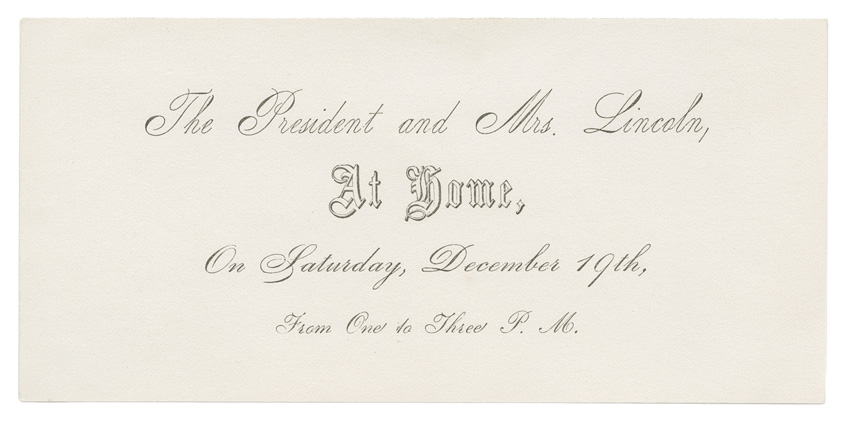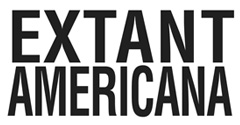
(Abraham LINCOLN) Printed invitation on a 2 1/2 x 5 1/4 in. card bearing the printed text: “The President and Mrs. Lincoln At Home, On Saturday, December 19th [1863] From One to Three P.M.” Offered with the original transmittal envelope addressed to “Hon. Martin Kalbfleisch & Family”
The occasion was to mark the visit of the Russian fleet to Washington. The visit was part of a major show of force on the part of Russia in support of the Union consisting of two fleets (one visiting the west coast and the other the east), in a show of force designed to send a strong message to Britian and France, both of whom had shown a degree of support to the Confederacy. According to a report from the National Intelligencer, the White House reception “was a very elegant and unusually agreeable affair. The presentation of the Russian Admiral and the officers of his fleet to the President and Mrs. Lincoln was gracefully done by Baron de Stoceckl, the Russian Minister. The President’s reception o them was courteous and cordial, and Mrs. Lincoln’s happy blending of dignity and urbanity. The visiters [sic] appreciated the friendliness of their reception, and soon made themselves at home in the company. The Diplomatic Corps were present in the persons of the Ministers of Brazil, Denmark, Sweden, France, and members of the British Legation. The Army, Navy, and Judiciary of the United States were well represented. Among the military officers present were Major Generals, Augur, Sickles, Hancock, Milroy, and Schofield…”1 The Russian fleet, commanded by Admiral Lesoffski, had arrived in the fall, making calls in Boston and New York before steaming for the Chesapeake.
Lincoln extended this invitation to Martin Kalbfleisch (1804 – 1873), a Dutch-born merchant and politician. Kalbfleisch settled in New York City in 1826 and soon established a chemical factory in Greenpoint in Brooklyn. From 1855 to 1861 he served as an alderman for the City of Brooklyn and in 1862 was elected as a Democrat to Congress and served for one term from 1863 to 1865. Kalbfleisch was an attendee of the 1866 Union National Convention in Philadelphia and also served twice as Mayor of Brooklyn – from 1862 to 1864 (overlapping his Congressional term), and again from 1867 to 1871. Why Lincoln thought it prudent to invite this one-term congressman is unknown. Kalbfleisch’s dual-role as a Brooklyn’s mayor and its representatives to Congress may have been an important factor as that city was the home of one of the most important naval bases in the country: the Brooklyn Navy Yard. Kalbfleisch was also a supporter of McClellan’s run for President and delivered public speeches denouncing the Emancipation Proclamation, the suspension of habeas corpus and the persecution of Clement Vallandingham.2 In Congress, he opposed the establishment of the Freedman’s Bureau.3 Perhaps Lincoln viewed the invitation as an opportunity to woo a political adversary.
Transmittal envelope has minor soiling and typical wear, card is extremely clean and in very fine condition.
(EXA 4299) SOLD.
_______________
______________________
1 “Reception at the Presidential Mansion” National Intelligencer, 21 Dec. 1863, 3.
2 See a transcript of Kalbfleisch’s 11 June 1863 speech to a Democratic meeting at the Brooklyn Academy of Music, “Free Speech! Free Press! Free Men – Democratic Mass Meeting in Brooklyn… Enthusiasm for General M’Clellan…” New York Herald, 12 June 1863, 10.
3 “The Emancipation Bureau” New-York Daily Reformer. 16 January 18645, 2.
